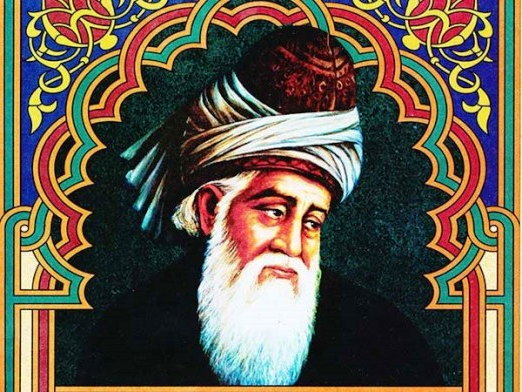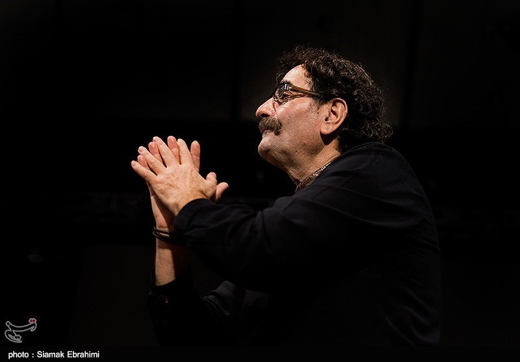
Throughout his singing career, Nazeri has always taken account of the conditions of society in his artwork. His historical look at music as a key part of Iranian culture has been indicative of his efforts to trace the roots of art in different historical periods.
That is why some view Nazeri as a pioneer of modern classical music in Iran. Nazeri has been among first vocalists to stage benefit concerts for people suffering from leprosy and a group of young girls who suffered severe burns after their classroom caught fire in Shinabad, West Azerbaijan Province.
He thinks of artists as a segment of society that speaks on behalf of the public and says he believes he and his fellow artists should make the most of the trust people have placed in them.
The 6th of Rabi’ al-Awwal – the third month in the Islamic calendar – marks the birth anniversary of Rumi. To commemorate the occasion which fell on December 29 this year, Shahrvand, a daily, interviewed Shahram Nazeri, among other things about, the thought-provoking aspects of social art. What comes next is a partial translation of the interview which appeared in the daily on December 30:
Today marks the birth anniversary of Rumi. As the first and perhaps the only Iranian vocalist who has set Rumi’s poetry to music, why do you think the world attaches so much significance to this Persian poet?
To learn about Rumi, one needs to explore his worldview which is so broad and comprehensive that his masterpiece Masnavi has become as a major reference in modern psychology in the US. I lay emphasis on the word “modern” to indicate the importance of the matter. It’s no mean feat!
Rumi is like an ocean only a drop of which can be explored. You know what that means? Centuries ago, a man from the Orient talked about issues that are today a reference for modern psychology. I have not sought to promote mysticism or mystical music by singing Rumi’s poems, rather I have wanted to present the approach of the mystical literature which covers the struggles and movements pioneered by Iranian ethnic groups for thousands of years.
What attracted you to Rumi and his thoughts?
Since I was a teenager, I have been infatuated with Rumi and profoundly impressed by him. I am so mesmerized by him that at the mention of his name, I get excited. I remember that I spent the whole night outside my uncle’s residence in Kermanshah talking until dawn about him with two likeminded poets who were friends of mine.
However, today, things have changed. The fast pace at which so-called artworks are cranked out does not leave any room for such infatuation and enthusiasm, nor does it give you an opportunity to devote attention to psychological and sociological aspects of great figures like Rumi.
Such enthusiasm has disappeared, and lots of things are fake. We live in an era that with a click of a mouse works which are in effect detrimental to arts are created in the name of art and fed to the public. A look back at architectural works in Iran and the rest of the world would be enough to help us realize what is going on. The masterpieces of the past have ceased to exist today.
The reason why we have ended up in this mess is that the atmosphere for creation is non-existent. Take a look back at the list of distinguished Iranian and world authors of the past. Today, they are sorely missed. They all emerged at a certain period and disappeared together. How many giants could possibly emerge in the world of art in a century? Today the stage has been set for the presence of dwarves whose number is actually very big. There used to be a hundred big authors in the world, but now we have three million dwarves who run the show.
Let me bring up the measures that you have taken to help patients suffering from leprosy and victims of the tragedy that happened in Shinabad. Do you believe that an artist is a representative of his society?
I believe that arts and artists represent their society. So I and people like me should make the most of the trust that people have placed in us. As for the concerts you pointed out, I must say that in fact society and those in authority do not pay much attention to those suffering from leprosy.
In such conditions, the presence of an artist on the scene could spur others into action. An opportunity to eradicate this disease has presented itself and we should make the most of it.
As far as I know about 60 years ago, French philanthropist and writer, Raoul Follereau, named the last Sunday of January as World Leprosy Day. Back then, there were 15 million people suffering from this disease.
Thanks to the intense battle fought against the disease over the years, the number of people suffering from leprosy across the world has plunged to two million. It’s a great pity that the number of those affected by this disease has increased in Iran.
In such conditions, as an artist of this land, I just want to speak on behalf of those suffering from this disease and say that they live among us. What else could be done rests with healthcare authorities. I just want to remind them as well as the public of what is going on. That’s all.
